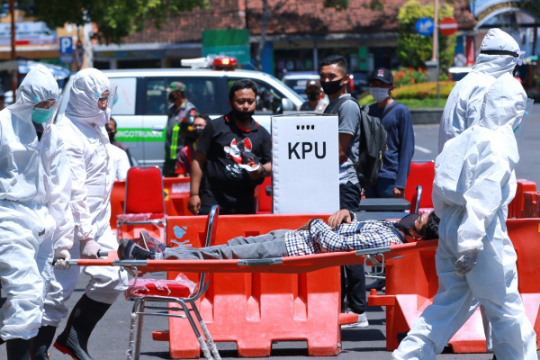Democracy in Indonesia moving from stagnation to regression
Emil Salim | 29 September 2020
The recently launched book Democracy in Indonesia: From Stagnation to Regression has grabbed the attention of many.
If initially after the fall of the New Order in 1998 Indonesia was transformed from a highly centralized regime into a vibrant democracy through a landmark election in 1999, two decades later, most political analysts agree that its democracy is in decline, as indicated by populist mobilization, growing intolerance, deepening sectarianism, increasingly dysfunctional electoral and representative institutions, and the deterioration of civil liberties.
So the dominant question arises: What explains Indonesia’s democratic regression that marked President Susilo Bambang Yudhoyono’s tenure (2004-2014) and President Joko “Jokowi” Widodo’s first term (2014-2019)? The next burning questions are: What will happen in the future? Will Indonesia slump into deeper regression?
The indications are that a vibrant democracy requires a total shift of direction in economic development, which has contributed to the ever-increasing unequal distribution of land and other natural resources between a narrow wealthy elite and the mass lower-income class. An effective democracy requires the cutting off of links among “local candidates of elected officials by financially strong businesspeople”. In brief, the contributors of the book argue for a complete separation from the political and corrupt business behaviors of past regimes if a clean democracy is to survive.
Indonesian democracy is in regression, but it can be diverted into progression if a two-pronged attack is targeted at (a) democratic regression from above, and (b) democratic regression from below.
With “democratic regression from above”, the book focuses on “political party leaders, elected politicians, state officials and wealthy capitalists” that have eroded the effectiveness of genuine democracy. The declining quality of Indonesian political parties comes with an absence of financial accountability.
The increase in the legislative threshold has made it impossible for new political parties to arise, with the tendency being that established political parties grow into dominating power groups. On the one hand high, the threshold “rationalizes” the Indonesian political party system. On the other hand, it opens the door for a conglomeration of “like-minded political parties” to morph into a controlling political force.
This may be useful as a countervailing power against the ruling political force. But it also runs the risk of cooptation of the small by strong political parties, hence reducing the effectiveness of “political checks and balances”.
The fact that regional head candidates require the support of political parties with seats in regional legislative councils opens the opportunity for the emergence of financial sponsors, which are locally called cukongdemokrasi.
“Democratic regression from below” is symbolized by the ineffectiveness of civil societies, NGOs, local adat (customary) leaders, intellectuals, farmers groups and labor unions in their participation in political and economic decision-making at the local and regional levels. The fact is that most local adat leaders, NGOs and civil societies face difficulties in actively engaging in the field. The “living space” for civil society is gradually being reduced. The license for international environmental group World Wildlife Fund, for example, was revoked even though it had worked in Indonesia for decades.
Most indications show that effective “democracy from below” is fading away.
More conclusive points can be drawn from the book, but suffice to say that “Indonesia is encountering a steep, difficult and winding road to an ideal Pancasila democracy that our founding fathers had fought for”. After reading the book and browsing the morning papers, one can sense the distress that this nation is encountering. The burning priority of the current agenda is, first, to beat COVID-19 and, second, to address the deepening economic recession.
In this time of pandemic, the government’s budget absorption capacity is sadly low. As of the third quarter of the year, only Rp 254.4 trillion or 36.59 percent of the budget had been allocated toward addressing the pandemic, with the Health Ministry spending a meager Rp 18.45 trillion of the fund.
And yet, the House of Representatives and the government continue deliberation of an omnibus bill that aims to recentralize important investment decisions from regional governments to the central government. In less than three months, the simultaneous regional elections will take place despite a warning from the Elections Supervisory Agency (Bawaslu) on the rising vulnerability of regions to the pandemic. At least 50 out of 270 regions that will host elections are classified as high-risk areas as of today, up from 27 in June.
In brief, the challenges to build a sound, healthy and responsible democracy in Indonesia are huge. My hope is, however, the uphill trials will ignite a common sense to face common concerns, especially among the millennial community.
The goal of a prosperous Indonesia must and can be reached by the new generation growing up in this new world of Industry 4.0 and Society 5.0. It is disheartening that a survey shows the current millennials are not interested in joining the current political system because of its negative image.
But as Endy Bayuni says in his foreword of the book, Indonesia’s democracy is like the popular dance Poco-Poco, with two steps back and one step forward to the rhythm of cha-cha-cha music.
Let’s pray that Indonesian democracy will follow the dance of Poco-Poco, but instead with one step back, 10 steps forwards to the rhythm of jazz music performed by millennials.
Emil Salim, Economist and Former politician, Indonesia.
This article was originally published on The Jakarta Post.
Views in this article are author’s own and do not necessarily reflect CGS policy.
